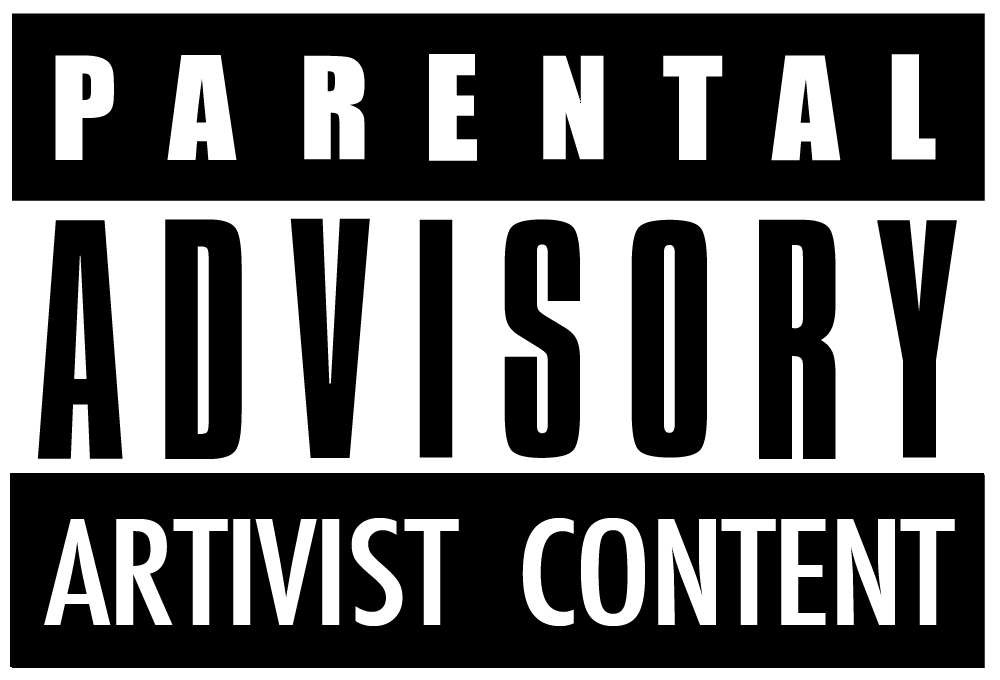ARTIVIST : CREATIVE > ELUCIDATE
ELUCIDATE |ɪˈL(J)UːSɪDEɪT| VERB [ TRANS. ]
make (something) clear; explain : work such as theirs will help to elucidate this matter See note at clarify . : [with clause ] in what follows I shall try to elucidate what I believe the problems to be | [ intrans. ] they would not elucidate further.
Creative / Technical / Production Design / Contracting / Guerrilla Media / Urban Arts; Fine Arts; Design//
ARTIVIST : creative work with artists on art.
>>>
ARTIVIST : creative conspire with the most experienced & productive artists + collaborate with capable & humble technicians = develop & deliver content / target demographics # create & make material to suit a specified audience!
artivist
Artivist is a portmanteau word combining “art” and “activist“. Artivism developed in recent years while the anti-globalization and antiwar protests emerged and proliferated. In most of the cases artivists attempt to push political agendas by the means of art. Yet this is not political art as it was known before, in the sense of artworks being political. The artivist is often involved in Streetart or Urban Art, Adbusting or Subvertising.
In some cases, Paris in 2003 for instance, artivists were arrested for acts of political art that verged on property destruction. A typical short term goal of artivists is to reclaim public space, especially by subvertising or destroying ads in urban areas or city transportation systems. Nevertheless artivists engage in different media like the internet not only for actions which could be described as hacktivism.
Often the acts of artivists can be refererred to as part of the larger concept of Culture jamming.
There is a chapter on Artivism in It’s Bigger Than Hip Hop by M.K. Asante, Jr.
Asante writes of the artivist:
“The artivist (artist + activist) uses her artistic talents to fight and struggle against injustice and oppression— by any medium necessary. The artivist merges commitment to freedom and justice with the pen, the lens, the brush, the voice, the body, and the imagination. The artivist knows that to make an observation is to have an obligation.”
creative
creative |kriːˈeɪtɪv|
adjective
relating to or involving the imagination or original ideas, esp. in the production of an artistic work : change unleashes people’s creative energy | creative writing.
• (of a person) having good imagination or original ideas : Homer, the creative genius of Greek epic.
noun
a person who is creative, typically in a professional context.
DERIVATIVES
creatively adverb
creativeness noun
THE RIGHT WORD
Everyone likes to think that he or she is creative, which is used to describe the active, exploratory minds possessed by artists, writers, and inventors (: a creative approach to problem-solving). Today, however, creative has become an advertising buzzword (: creative cooking,: creative hairstyling) that simply means new or different.
Original is more specific and limited in scope. Someone who is original comes up with things that no one else has thought of (: an original approach to constructing a doghouse), or thinks in an independent and creative way (: a highly original filmmaker).
Imaginative implies having an active and creative imagination, which often means that the person visualizes things quite differently than the way they appear in the real world (: imaginative illustrations for a children’s book).
The practical side of imaginative is inventive; the inventive person figures out how to make things work (: an inventive solution to the problem of getting a wheelchair into a van).
But where an inventive mind tends to comes up with solutions to problems it has posed for itself, a resourceful mind deals successfully with externally imposed problems or limitations (: A resourceful child can amuse herself with simple wooden blocks).
Someone who is ingenious is both inventive and resourceful, with a dose of cleverness thrown in (: the ingenious idea of using recycled plastic to create a warm, fleecelike fabric).
“by any means necessary!”
Frantz Fanon
The phrase is a translation of a sentence used in revolutionary psychiatrist and philosopher Frantz Fanon's 1960 Address to the Accra Positive Action Conference, "Why we use violence":
Violence in everyday behaviour, violence against the past that is emptied of all substance, violence against the future, for the colonial regime presents itself as necessarily eternal. We see, therefore, that the colonized people, caught in a web of a three-dimensional violence, a meeting point of multiple, diverse, repeated, cumulative violences, are soon logically confronted by the problem of ending the colonial regime by any means necessary. —Frantz Fanon, Alienation and Freedom: part 3, chapter 22, "Why we use violence". 1960
Jean Paul Sartre
The phrase is from a translation of a sentence used in French intellectual Jean Paul Sartre‘s play Dirty Hands:
“ I was not the one to invent lies: they were created in a society divided by class and each of us inherited lies when we were born. It is not by refusing to lie that we will abolish lies: it is by eradicating class by any means necessary.” ”
— Jean Paul Sartre, Dirty Hands: act 5, scene 3. 1963
Malcolm X
It entered the popular culture through a speech given by Malcolm X in the last year of his life.
“ We declare our right on this earth to be a man, to be a human being, to be respected as a human being, to be given the rights of a human being in this society, on this earth, in this day, which we intend to bring into existence by any means necessary.”
— Malcolm X, 1965





